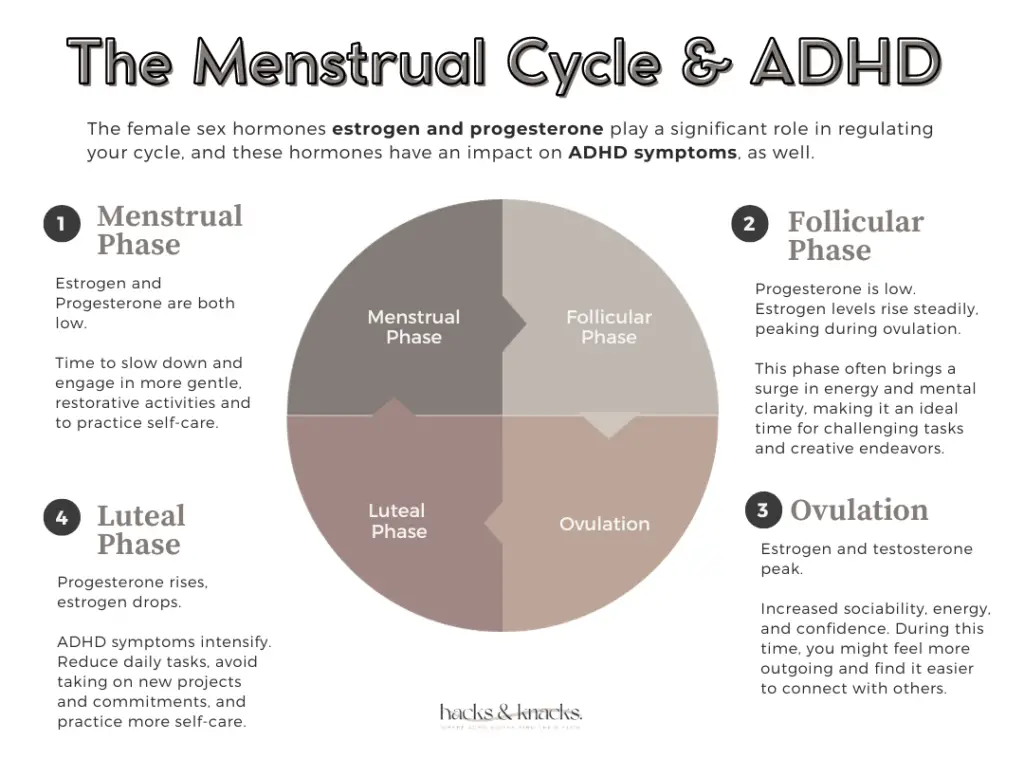What’s inside this article: A look at how hormonal fluctuations throughout our menstrual cycle impact ADHD symptoms and how to use that information to your advantage.

If you’re a woman with ADHD, your menstrual cycle may significantly impact your symptoms. Hormonal fluctuations during different phases of the menstrual cycle can either alleviate or exacerbate ADHD symptoms.
Understanding and tracking these changes can be a powerful tool for managing ADHD. It enables you to leverage periods of heightened focus and productivity and to adopt coping strategies during times when symptoms intensify due to hormonal shifts.
This article teaches you why your menstrual cycle affects your ADHD symptoms and how to make effective lifestyle changes to balance these effects.
The Menstrual Cycle
The menstrual cycle length varies from woman to woman, but the average cycle length is 28 days.
Regular cycles that are longer or shorter than this, from 23 to 35 days, are healthy and normal. Your menstrual cycle is measured from the first day of your period to the last day before your next period.
Factors such as age, weight, lifestyle habits, and stress levels can impact the length of your menstrual cycle.
The female sex hormones estrogen and progesterone play a significant role in regulating your cycle and these hormones have an impact on ADHD symptoms, as well.
Estrogen:
Estrogen plays a significant role in the regulation of neurotransmitters that are directly relevant to ADHD symptoms. Here’s how:
- Enhances Neurotransmitter Activity: Estrogen increases the production and release of neurotransmitters like dopamine, norepinephrine, and serotonin. People with ADHD have a dopamine deficiency. These chemicals are crucial for attention, motivation, and mood regulation, which are often areas of difficulty for those with ADHD.
- Increases Receptor Sensitivity: Estrogen makes the brain more sensitive to dopamine and norepinephrine. This increased sensitivity can lead to improved focus, better mood regulation, and a decrease in classic ADHD symptoms like inattentiveness and impulsivity.
- Neuroprotective Effects: Estrogen has neuroprotective properties, helping maintain healthy brain function.
Progesterone:
Progesterone, on the other hand, can have a different and often more challenging impact on ADHD symptoms:
- Modulates GABA: Progesterone increases the production of a neurotransmitter called gamma-aminobutyric acid (GABA), which has a calming effect on the brain. While this can be beneficial in reducing anxiety, it can also lead to increased feelings of fatigue and brain fog.
- Counteracts Estrogen: Progesterone can counteract some of estrogen’s positive effects on dopamine and serotonin activity. This means that as progesterone levels rise, particularly in the luteal phase of the menstrual cycle, women with ADHD might experience a decline in focus, mood stability, and overall cognitive function.
- Increases in Cortisol: Progesterone is a precursor to cortisol, the stress hormone. An increase in cortisol leads to heightened stress responses, which can further impair attention and executive functioning in individuals with ADHD.

Menstrual Phase
This is the phase where menstruation occurs, marking the beginning of the cycle.
Hormonal Changes: Both estrogen and progesterone levels are at their lowest during this phase.
The menstrual phase is often viewed as a time of discomfort. However, for most women, after the first couple days, it can actually be a period of relaxation and rejuvenation.
This is a great time to slow down and engage in more gentle, restorative activities and to practice self-care.
Follicular Phase
This phase overlaps with menstruation and continues until ovulation.
Hormonal Changes: Estrogen levels rise steadily up to ovulation (when they peak).
Impact on ADHD: The steady increase of estrogen during this phase benefits dopamine activity. You’ll notice your ADHD symptoms aren’t as intense during this time.
You will likely have better focus, mood, and energy levels compared to your luteal phase and the first couple of days of your menstrual phase.
Women’s bodies are also more micronutrient absorbent during this time, so it’s a great time to pay extra attention to adequately nourishing your body.
This phase often brings a surge in energy and mental clarity, making it an ideal time for challenging tasks and creative endeavors.
Ovulation
Hormonal Changes: A surge in estrogen and luteinizing hormone (LH) triggers the release of an egg. Women also experience a rise in testosterone during ovulation.
During ovulation, your ADHD symptoms will be at their most manageable levels because estrogen is at its peak.
The rise in testosterone as well leads to increased sociability, energy, and confidence. During this time, you might feel more outgoing and find it easier to connect with others.
Luteal Phase
This phase begins post-ovulation and lasts until menstruation.
Hormonal Changes: After ovulation, progesterone levels rise, and estrogen levels drop.
The luteal phase is a challenging time for many women with ADHD. You may find your ADHD symptoms are exacerbated during this phase.
Women often feel unmotivated, scatterbrained, and more impulsive during their luteal phase. They also may feel more emotionally reactive or emotionally impulsive.
During the luteal phase, you should reduce daily tasks as much as possible, avoid taking on new projects and commitments, and practice more self-care.
Tracking Your Cycle
If you want to leverage this information, the first step is to understand your cycle so you know which phase you’re in and when you’re in it.
There are tons of different period tracking apps out there.
- Clue
- Flo
- Cycles
- Femble – This app is still in beta testing; however, it provides fully personalized nutrition, workout, and mental well-being content tailored to each user’s hormonal cycle and symptoms.
Once you’ve decided on the best app for you, it’s important to:
- Track regularly: Consistently log your period data and symptoms in the app. This helps in identifying patterns and planning accordingly. Once an app has a few months of data, it can accurately predict upcoming periods and let you know your menstrual phase.
- Keep detailed notes: Make detailed notes in the app about changes in focus, mood, or energy levels to correlate them with your cycle phases.
Diet and Lifestyle Changes Based on Menstrual Phases
Making changes to your lifestyle and your diet during different menstrual phases can have a powerful effect on your well-being and productivity levels.
Planning Based on Your Menstrual Phase:
Planning your day-to-day based on your menstrual cycle can help you tackle the hard stuff during times when your ADHD symptoms are at their lowest and rest more during times when they’re at their worst.
Follicular Phase
- Focus on Challenging Tasks: Leverage increased focus and energy levels for demanding projects or tasks requiring high concentration.
- Start New Projects: This is the ideal time to begin new initiatives or creative endeavors.
- Increase Social Interactions: Utilize the heightened energy for networking or collaborative work.
Ovulation (Mid-Cycle)
- Schedule Social Events: Plan meetings, networking events, or social gatherings during this phase when sociability and confidence peak.
- Take on Leadership Roles: Engage in activities or projects requiring leadership and assertiveness.
Luteal Phase
- Plan for Downtime: Expect a decrease in energy levels and plan less demanding tasks.
- Increase Self-Care: Incorporate activities that promote relaxation and stress relief.
- Adjust Workload: Reduce workload or set more flexible deadlines during this phase.
Menstrual Phase
- Schedule Light Activities: Focus on less demanding, routine tasks.
- Prioritize Rest: Ensure adequate rest and sleep to cope with lower energy levels.
- Reflect and Review: Use this time for reflection, planning, and setting intentions for the next cycle.
Diet Changes for Each Menstrual Phase:
Follicular Phase and Ovulation:
Your body is more micronutrient absorbent during this time. You should ensure your diet is rich in:
- Complex carbohydrates – whole grains, brown rice, oatmeal, quinoa, etc
- Citrus – oranges, grapefruit, lemons, limes, etc
- Fermented foods – such as yogurt, cheese, apple cider vinegar, kombucha, etc
- Micronutrient-dense vegetables – spinach, kale, carrots, broccoli, Brussel sprouts, etc
- Healthy fats – eggs, avocado, nuts, fish, etc
Luteal Phase
Women’s metabolism is higher during the luteal phase, and you may require 50-500 more calories per day for maintenance.
You’re also more insulin-resistant during your luteal phase, so avoiding sugars is important, especially first thing in the morning. Otherwise, they can contribute to a crash later, intensifying symptoms even more.
During your luteal phase, modify your diet, so it’s higher in:
- Protein – lean meats, lentils, eggs, etc.
- Root vegetables – sweet potatoes, carrots, beets, garlic, onion, turnip, etc
Menstrual Phase
During menstruation, you should try to include the following in your diet:
- More magnesium – spinach, dark chocolate, almonds, black beans
- Foods containing polyphenols (anti-inflammatory properties) – apples, berries, broccoli, chili peppers
- Seaweed – stabilizes hormone levels and helps balance estrogen.
- Shellfish – high in iron and zinc, can help regulate your menstrual cycle
Korra O’Neill is an Integrative Nutrition Health Coach who talks in detail about eating for your menstrual cycle on the Women and ADHD podcast. She offers a subscription-based service called Food for your Phases that includes monthly recipes and a grocery list to help ADHD women choose meals based on their menstrual cycle.
In conclusion, understanding the interplay between the phases of your menstrual cycle and ADHD symptoms offers a powerful approach to managing ADHD.
By tracking your cycle, planning accordingly, and making appropriate diet and lifestyle adjustments, you can navigate these fluctuations more effectively, leading to increased productivity and well-being.





